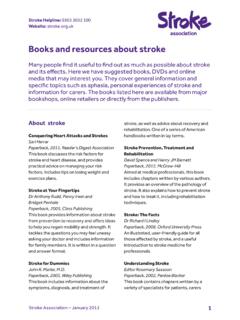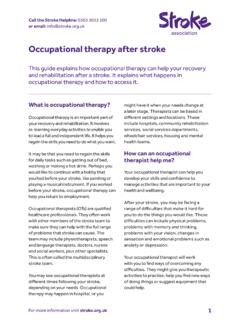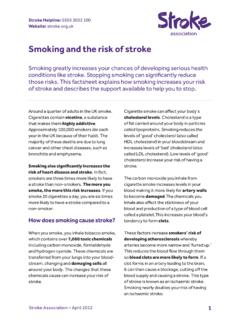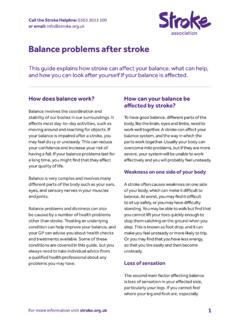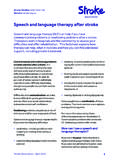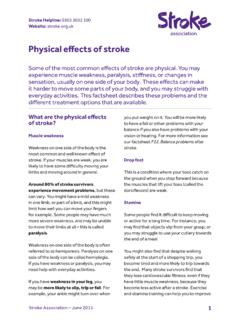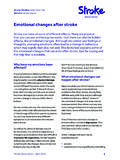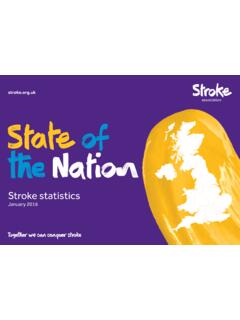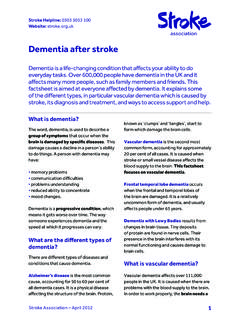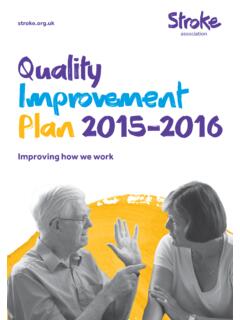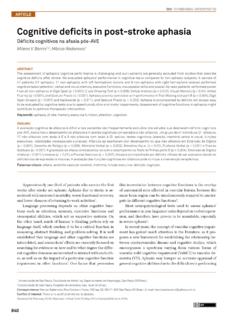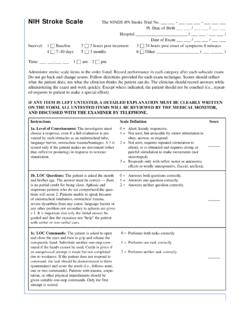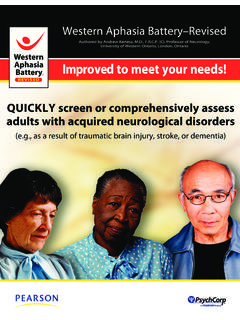Transcription of Communication problems ater stroke
1 stroke Helpline: 0303 3033 100 Website: problems after strokeStroke Association April 20121 Many people have Communication problems after a stroke . About a third of stroke survivors have some difficulty with speaking or understanding what others say, and this can be frightening and frustrating. This factsheet is aimed at family members and carers who support people with these difficulties. It explains the types of problems that can arise, the help and support available, and offers some tips to aid is a stroke ?A stroke is an injury to the brain. The brain controls everything we do including everything we interpret and understand.
2 A stroke can cause problems with communicating if there is damage to the parts of the brain responsible for language. These functions are controlled by the left side of the brain in most people. As one side of the brain controls the opposite side of the body, many people who have Communication problems after stroke also have weakness or paralysis on the right side of their can also cause Communication problems if muscles in the face, tongue or throat are can stroke affect Communication ?The range of Communication problems someone has will depend on where in the brain the stroke happened and how large an area was damaged.
3 A stroke can affect how you speak, understand speech, read or write. A stroke can affect Communication in different ways. The main conditions that can happen after stroke are: aphasia dysarthria (sometimes called dysphasia) is the name for the most common language disorder caused by stroke . aphasia can affect how you speak, your ability to understand what is being said, and your reading or writing skills. It does not affect intelligence, although sometimes people think it can be very mild, and sometimes only affects one form of Communication , such as reading. However, it is more common for several aspects of Communication to be affected at the same time.
4 F03_Communication 102/03/2012 09:34:35 stroke Association April 20122 Communication problems after strokeThere are different types of aphasia : If your problems are mainly with understanding what is being said, this is called receptive aphasia . If you mostly understand others, but have difficulties expressing what you want to say, this is called expressive aphasia . A combination of problems that changes all or most of your Communication may be referred to as mixed aphasia , or global aphasia if the effects are severe. Below are some examples of the different ways aphasia can affect with receptive aphasia may: not understand much of what other people say and feel as though others are talking in an unknown foreign language.
5 Not understand when people speak in long, complex sentences and may forget the start of what they said. not understand others if there is background noise or if different people are talking in a group. be able to read newspaper headlines, but not understand the rest of the text. be able to write but unable to read back what they ve with expressive aphasia may: not be able to speak at all. They may communicate by making sounds but not be able to form words. have difficulty speaking in normal sentences. They may say only single words or very short sentences, missing out crucial words.
6 They may write in a similar way. speak with frequent pauses and be unable to find the word they want to say yet it may be on the tip of their tongue. answer yes or no , but mean the opposite so their answers are not reliable. think of the word they want to say, but another word comes out for example, milk instead of water . speak at a normal rate, but much of what they say is unrecognisable and has limited meaning. They may not realise this and others may wrongly think they are confused. describe or refer to objects and places, but not be able to name them. They miss out the words they can t think of.
7 Say only a few set words in answer to any question. They may be emotional words, such as swear words. get stuck on a single word or sound and end up repeating happens when a stroke causes weakness of the muscles you use to speak. This may affect the muscles you use to move your tongue, lips or mouth, control your breathing when you speak or produce your 202/03/2012 09:34:35 stroke Association April 20123 Communication problems after strokeDysarthia does not affect your ability to find the words you want to say or to understand others, unless you have other Communication problems at the same time.
8 If you have dysarthria, your voice may sound different and you may have difficulty speaking clearly. You may find your voice sounds slurred, strained, quiet or slow. Other people may find your voice hard to understand. If breath control is affected, you may need to speak in short bursts rather than in complete sentences. DyspraxiaDyspraxia is a condition that affects movement and coordination. Dyspraxia of speech happens when you cannot move muscles in the correct order and sequence to make the sounds needed for clear speech. The individual muscles you use to produce clear speech may be working well and you may have no weakness or paralysis, but you cannot move them as and when you want to in the right order and in a consistent way.
9 If you have dyspraxia, you may not be able to pronounce words clearly, especially when someone asks you to say them. You may try several times to repeat them and may want to keep trying to correct yourself. At times, you may be unable to make any sound at can be frightening and distressing to have difficulty communicating after stroke . It can be difficult to join in conversations and this can be very frustrating. If the ability to read is affected, everyday activities such as choosing from a menu or reading signs or prescriptions can become other effects of stroke affect Communication ?
10 stroke can cause other problems that affect a person s ability to communicate well. It may help to be aware of these during conversations:Changes to the emotional content of communicationA stroke can sometimes cause subtle changes to emotional aspects of speech. For example, your tone of voice may sound flat or your facial expression may not vary. You may have difficulty understanding humour or when to take turns in conversation. You may be aware of these effects and frustrated by them, or you may be unaware. These types of changes can happen even if there are no other Communication problems after stroke .
